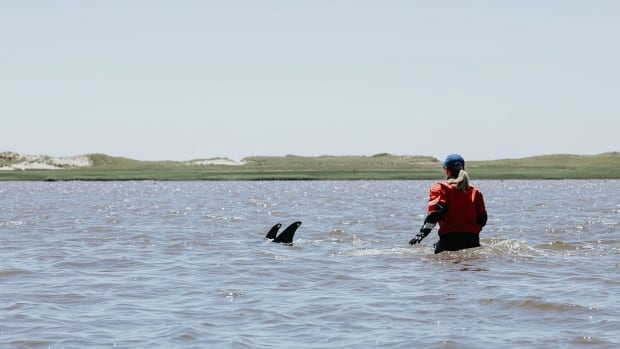As It Happens7:59100 dolphins rescued from low tide in Cape Cod
Rescuers believe 100 dolphins have made it to safety following the largest dolphin rescue effort ever performed by the International Fund for Animal Welfare (IFAW). Sarah Sharp, an animal rescue veterinarian with the IFAW, told As It Happens guest host Peter Armstrong about the rescue.
Rescuers from the International Fund for Animal Welfare (IFAW) say 100 dolphins have made it to safety following one of the largest dolphin rescue efforts ever performed by the non-profit group.
When Sarah Sharp, an animal rescue veterinarian with the IFAW, arrived in Cape Cod, Mass., on Friday, she was told that there were about 10 dolphins trapped by low tide in the shallow waters of Herring River — only to find pver 100 animals there.
“With just that sheer number of dolphins … we knew we really had our work cut out for us,” Sharp told As It Happens guest host Peter Armstrong. “It was a pretty overwhelming sight for sure.”
It’s not an uncommon occurrence, according to Sharp. She says there’s a “hook” of land that can trap the dolphins in Herring River, which leads to up to 30 dolphin rescues in the area each year.
Usually only two to 10 dolphins at a time find themselves stuck however, according to Sharp, with the biggest rescue previously being 45 animals.
‘A whack-a-mole situation’
Sharp says there are a number of risks for dolphins trapped in shallow water.
The experience can be traumatic for dolphins, similar to a human being in a car crash, according to Sharp.
She also says there were a lot of oyster shells littering the ocean floor, which can be sharp and cut the aquatic mammals.
“Our job is to keep them basically lying on their bellies and keep that blowhole … out of the water. So that is really a hard thing to do when you’ve got 120 animals and not as many people,” said Sharp.
“It feels kind of like a whack-a-mole situation where you get one animal in a good situation [and] you have to run to the next.”
The team had to keep the dolphins rolled right-side up for a few hours, while they waited for the tide to come back in. That’s when Sharp says there can be a bit of panic, as the dolphins start to move around.

100 dolphins survived
With the animals free to move again, the rescuers next challenge was herding the mammals out of the harbour and into Cape Cod Bay.
Sharp said most of the animals had no problem, but there were a few pods that needed some extra help.
“Especially after going through a stranding, these animals aren’t in the best shape to be able to figure out how to get out of a tricky situation,” said Sharp.
From start to finish, the rescue took from about 10 a.m. to 9 p.m. on Friday.






